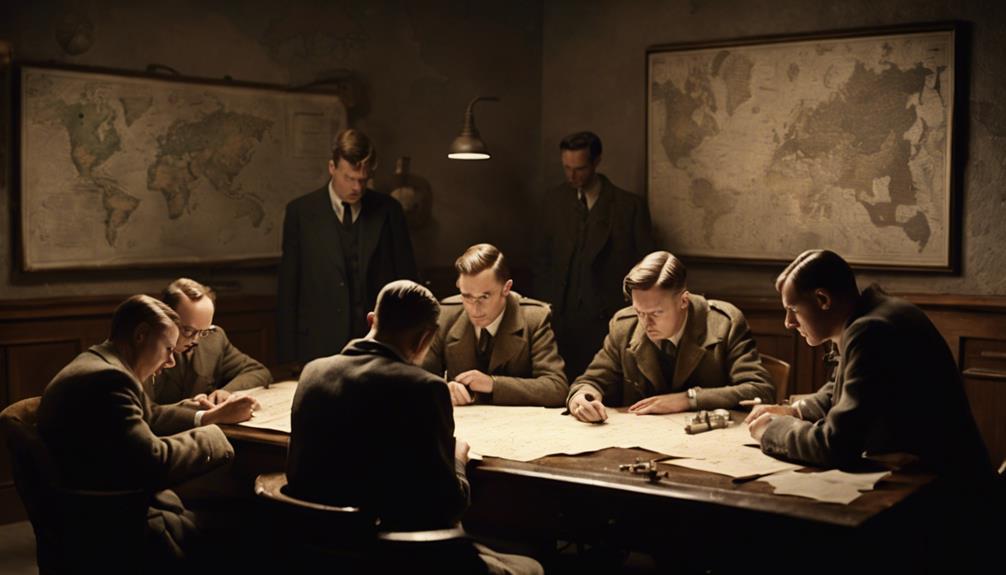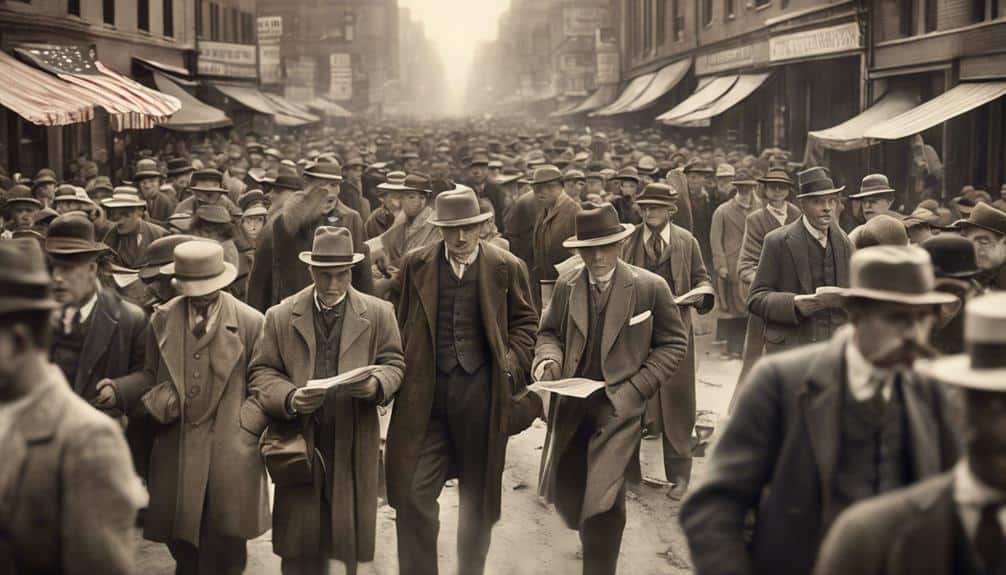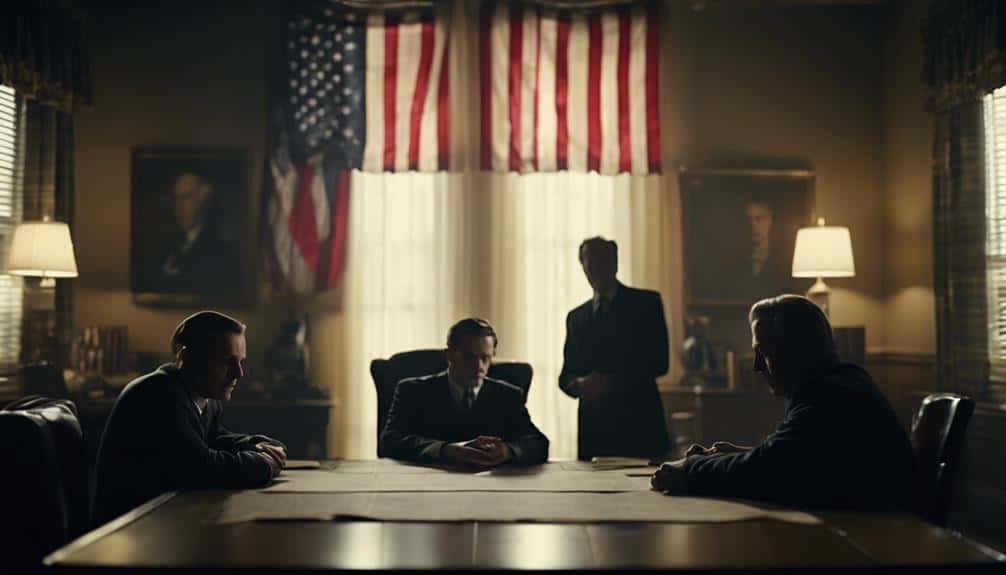Discover how a secret message from Germany to Mexico, intercepted by British codebreakers, drastically shifted American public opinion and led to the U.S. entering World War I.
Unveil the intriguing story behind the Zimmermann Telegram and its profound impact on history.
Prelude to U.S. Involvement
Before the discovery of the Zimmermann Telegram, the U.S.'s involvement in World War I was largely defined by its stance of cautious neutrality. Despite growing tensions and occasional provocations, the United States maintained a diplomatic distance from the conflict ravaging Europe.
The situation shifted dramatically when German Foreign Secretary Arthur Zimmermann sent a secret message to Mexico, proposing an alliance against the U.S. In the telegram, Zimmermann suggested that Mexico join the war on Germany's side in exchange for the return of territories lost during the Mexican-American War—specifically Texas, New Mexico, and Arizona.
British intelligence intercepted and decoded this message, revealing Germany's intentions. The exposure of the Zimmermann Telegram was a pivotal moment, as it was subsequently published in American newspapers, igniting outrage among the American public.
This revelation underscored Germany's willingness to instigate conflict on American soil, thereby threatening national security. The diplomatic implications were profound; the message not only proposed an alliance but also demonstrated Germany's underhanded tactics.
The U.S. Congress, influenced heavily by the shift in public opinion and the undeniable threat posed by the German proposal, ultimately declared war on Germany and its allies, marking a significant turn away from neutrality.
German Espionage Activities

You should examine how German espionage activities during WWI aimed to disrupt U.S. support for the Allies, particularly through sabotage operations like the Black Tom Explosions. Ambassador Bernstorff directed these efforts, managing a network of spies to target American ammunition supplies.
British intelligence's interception of these sabotage reports greatly influenced America's decision to enter the war.
German Sabotage Operations
German sabotage operations during World War I, meticulously coordinated by Ambassador Bernstorff, aimed to cripple Allied supply lines and draw the United States into the conflict. German spies were tasked with disrupting ammunition supplies destined for the British. These espionage and sabotage operations extended throughout the Western Hemisphere, creating significant disruptions.
One of the most notorious incidents was the Black Tom Explosions in New Jersey in 1916. German saboteurs orchestrated this catastrophic event, causing massive destruction and highlighting the lengths to which Germany would go to hinder the Allies. The explosions resulted in millions of dollars in damage and underscored the serious threat posed by German espionage activities.
Ambassador Bernstorff played a pivotal role in these operations, overseeing and coordinating efforts to guarantee their success. Reports of sabotage were intercepted by the British, who used this information to help draw America into the war against Germany.
The impact of these sabotage operations was felt long after the war ended. In 1939, Germany was held responsible for the Black Tom Explosions, leading to a settlement with the United States. This settlement underlined the enduring consequences of Germany's wartime espionage and sabotage activities.
Spies and Espionage Networks
Amidst the chaos of World War I, espionage networks operated by Germany were intricately woven into the fabric of American society, aiming to sabotage the Allied war effort from within. German spies, under the direction of German Ambassador Bernstorff, orchestrated extensive espionage and sabotage activities across the Western Hemisphere. These operatives targeted vital infrastructure, particularly focusing on disrupting ammunition supplies destined for the British.
One of the most notorious examples of German sabotage was the Black Tom Explosions in New Jersey in 1916. German saboteurs managed to infiltrate and detonate a munitions depot, causing widespread destruction and highlighting the grave threats posed by German espionage. These actions didn't just damage property; they were a direct assault on U.S. neutrality and security.
Reports of German sabotage, intercepted by the British, were instrumental in swaying American public opinion and political resolve.
The consequences of these espionage activities were far-reaching. Germany was held responsible for the Black Tom Explosions in 1939, culminating in a settlement with the U.S. This settlement underscored the enduring impact of German espionage and sabotage on American soil during World War I.
Impact on U.S. Security
The German spying operations during World War I compromised U.S. security by targeting essential infrastructure and stirring public unease, ultimately influencing America's entry into the conflict.
German espionage, orchestrated by Ambassador Bernstorff, focused on disrupting ammunition supplies to the British. These sabotage efforts in the Western Hemisphere included the notorious Black Tom Explosions in New Jersey in 1916, which caused notable damage and loss of life.
Ambassador Bernstorff's network managed to infiltrate key areas, heightening the impact on U.S. security. The Black Tom Explosions alone highlighted the vulnerability of American infrastructure and the extents to which Germany would go to hinder the Allied war effort. German espionage activities created a climate of fear and suspicion, aggravating the American public's anxiety about national security.
The British interception of German sabotage reports, including the infamous Zimmerman Telegram, played an essential role in exposing these threats. By revealing Germany's plans and actions, the British aimed to draw America into the war. The Zimmerman Telegram, coupled with the direct impact of German sabotage, significantly influenced public opinion and political will, leading to America's entry into the war.
Therefore, German espionage had a profound and lasting impact on U.S. security during WWI.
The Telegram's Content

In the Zimmermann Telegram, Germany proposed a bold military alliance with Mexico, promising the return of Texas, New Mexico, and Arizona if they joined forces against the United States. This secret message was intended to sway Mexico into an alliance at a time when the world was engulfed in the chaos of World War I. Germany's offer was strategic, as they anticipated resuming unrestricted submarine warfare, which would likely provoke the U.S. into entering the war.
The alliance proposal included not only promises of territorial gains for Mexico but also the potential involvement of Japan, another key player in the global conflict. By suggesting such an alliance, Germany aimed to create a multi-front challenge for the United States, thereby diverting American resources and attention away from Europe.
The content of the Zimmermann Telegram had a profound impact on U.S. foreign policy and public sentiment. When the message was made public, it fueled anti-German feelings and contributed to the U.S. decision to join the Allied forces. Understanding this telegram's content helps you grasp how a single secret message could alter the course of history by shifting public opinion and influencing international alliances.
British Codebreakers

British codebreakers, working tirelessly in Room 40, intercepted and decoded the Zimmermann Telegram in 1917, altering the course of history. These dedicated individuals, including Nigel de Grey, were pivotal in deciphering the cryptic message.
The intercepted intelligence revealed Germany's proposal to Mexico to join the war against the United States, promising the return of lost territories. Room 40, the hub of British intelligence operations, meticulously analyzed and decoded the Zimmermann Telegram.
Nigel de Grey's expertise turned the coded message into a clear threat that couldn't be overlooked. This breakthrough was more than just a technical achievement; it was a strategic decision by British intelligence to delay sharing the decoded message.
The British believed that revealing the Zimmermann Telegram would push the U.S. into entering World War I. They carefully chose the moment to present a copy of the decoded message to the American embassy, crafting a narrative that it was intercepted in Mexico.
This move guaranteed the authenticity of the intelligence and its impact on American policymakers. The decoded Zimmermann Telegram ultimately played a vital role in swaying the U.S. to join the Allies, altering the war's trajectory and shaping global history.
American Public Reaction

Outraged and alarmed, the American public quickly grasped the dire implications of Germany's covert attempt to entice Mexico into a military alliance against the United States. The Zimmermann Telegram, revealed on March 1, 1917, instantly dominated headlines in American newspapers, which detailed Germany's proposal for Mexico to reclaim lost territories in Texas, New Mexico, and Arizona. This blatant threat to American sovereignty galvanized public opinion against Germany.
You can't overlook how this revelation shattered the prevailing sentiment of U.S. neutrality. The American public reaction was one of shock and anger, feeling directly threatened by Germany's diplomatic traffic. The contents of the Zimmermann Telegram left little room for doubt about Germany's hostile intentions, fundamentally altering the perception of the conflict in Europe.
Before the telegram's disclosure, many Americans clung to the hope of staying out of World War I. But the Zimmermann Telegram's exposure shifted American opinion dramatically, making it apparent that neutrality was no longer tenable. This shift in sentiment was a pivotal factor that led to the United States entering the war.
The outcry over the telegram greatly influenced the eventual declaration of war on Germany, marking a definitive end to U.S. neutrality.
Impact on U.S. Policy

You can see how the Zimmerman Telegram's revelation shifted American public sentiment dramatically against Germany, setting the stage for significant changes in U.S. policy.
This shift made it politically feasible for President Wilson to advocate for war, leading Congress to pass a resolution declaring war on Germany in April 1917.
The release of the telegram marked a significant turning point, ending American neutrality and leading to active involvement in World War I.
Shift in Public Sentiment
The exposure of the Zimmermann Telegram significantly altered American public sentiment, impacting U.S. policy by heightening anti-German feelings and moving the nation closer to joining World War I.
When the United States government revealed the telegram, Americans were outraged by Germany's proposal of a military alliance with Mexico. This fueled anti-German sentiment across the country and influenced American foreign policy.
Public sentiment, already tense due to previous German actions like unrestricted submarine warfare, turned overwhelmingly hostile. The idea that Germany sought to incite conflict on American soil by promising Mexico the territories of Texas, New Mexico, and Arizona was seen as a direct threat. This revelation played a pivotal role in shaping the national discourse.
President Wilson, who'd maintained a stance of neutrality, now faced immense pressure from the American public and political landscape. The Zimmermann Telegram's exposure provided him with the justification to shift his policy stance. Ultimately, the heightened public outrage and anti-German sentiment were critical in his decision to seek a declaration of war against Germany.
Therefore, the telegram's impact on public sentiment directly influenced the United States' trajectory towards active involvement in World War I.
Congressional War Resolution
In response to escalating German provocations, Congress passed the war resolution on April 6, 1917, marking a decisive shift in U.S. foreign policy towards active involvement in World War I. This critical decision was driven by German actions, including the notorious Zimmermann Telegram and the sinking of U.S. merchant ships.
The Zimmermann Telegram, in particular, revealed Germany's proposal to Mexico to join the war against the United States, which ignited widespread outrage and fear. President Wilson's war message to Congress in March 1917 laid the groundwork for the resolution. In his address, Wilson emphasized the threat posed by unrestricted submarine warfare and the Zimmermann Telegram, urging lawmakers to recognize the necessity of military force authorization.
The Congressional war resolution thereby authorized the use of military force against Germany and its allies, solidifying America's commitment to the Allied cause. This resolution signaled a profound U.S. foreign policy shift. Previously committed to neutrality, the U.S. was now officially entering WWI, ready to influence the outcome decisively.
America's entry into WWI marked a pivotal moment, showcasing its willingness to defend its interests and uphold international stability through direct military engagement.
Legacy of the Telegram

Beyond its immediate impact, the Zimmermann Telegram left a lasting imprint on international diplomacy and American foreign policy. When the British intercepted and revealed the secret proposal from Germany to Mexico, it dramatically shifted American public opinion. The idea that Germany would incite Mexico to attack the United States in exchange for territory was shocking.
Coupled with unrestricted submarine warfare, it painted Germany as a direct threat. President Woodrow Wilson's subsequent request for a declaration of war on April 2, 1917, marked the United States' official entry into World War I, fundamentally altering the course of the conflict and diplomatic relations.
The telegram's revelation demonstrated the power of intelligence and communication in shaping global events. It underscored the importance of maintaining secure diplomatic channels and the potential fallout from their breach. The incident also highlighted the British expertise in code-breaking and its strategic use of intercepted communications to influence American decisions.
In the broader context, the Zimmermann Telegram reinforced the necessity for nations to take into account public opinion in their foreign policy strategies. Its impact on American neutrality serves as a case study in how a single piece of intelligence can pivot a country's stance from isolation to active engagement in global affairs.


